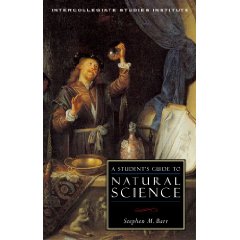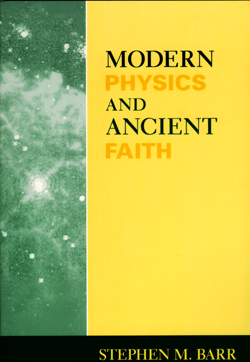Stephen Barr
"Modern Physics, Ancient Faith"
Stephen Barr
"Modern Physics, Ancient Faith"
Minor Hall / University of Virginia
Wednesday, February 18, 2009, 7:00-8:30pm
Why is it widely believed that religious faith has something to fear from or is somehow contradicted by modern science?  Professor Stephen A. Barr, a theoretical particle physicist at the Bartol Research Institute, author of Modern Science, Ancient Faith (University of Notre Dame Press) and a regular First Things essayist on the philosophy of science and religion, debunked this "science against religion" storyline by systematically explaining how there really isn't a conflict between science and Biblical religious traditions. Instead the origin of this conflict can be traced to its source: a set of ideas he broadly identified as "scientific materialism."
Professor Stephen A. Barr, a theoretical particle physicist at the Bartol Research Institute, author of Modern Science, Ancient Faith (University of Notre Dame Press) and a regular First Things essayist on the philosophy of science and religion, debunked this "science against religion" storyline by systematically explaining how there really isn't a conflict between science and Biblical religious traditions. Instead the origin of this conflict can be traced to its source: a set of ideas he broadly identified as "scientific materialism."
According to Barr, "scientific materialism" draws most of its desciptive and explanatory symbols from 19th century scientific views of a mechanistic world. From the perspective of 21st century science--or even early 20th century science--this materialist-mechanistic belief system is unrelated to the major theoretical and empirical achievements that define modern science. Scientific materialism, thus, masquerades as science when, at bottom, it is a simple often totalizing ideology--vigorously promoted by some, unwittingly accepted by others. This set of ideas contends that all of reality (including humanity) can and must ultimately be understood in terms of matter. Like other modernist ideologies, proponents claim it to have a salvific and truth-seeking aspiration, which at some future point will ultimately enable us to possess a complete, deterministic, and predictive knowledge of the physical world, including all of humanity.
But without foundational support from modern science, how can the retro-ideology of scientific materialism survive and seemingly flourish in today's culture? Professor Barr provides a fuller answer to this question in his book Modern Science, Ancient Faith. In brief, he explained that this ideology persists because it uses caricatures of Biblical religions and religious belief as counter-ideas to claim religion, especially Christianity, is incompatible with and has been hostile to scientical pursuits. Nothing, however, could be further from the truth. Indeed, the tradition of the Torah and its inspired teachings prepared the ground for modern science by introducing, contrary to prevailing pagan ideas of a divine material world, the idea of an external Authority and Lawgiver who created a lawful natural order in which humanity possessed a special place because of our faculties. .jpg) In this way, the world was desacralized and stripped of its unknowable supranatural qualities, and humanity was elevated because we could not only experience, but examine and come to know the world and its various properties. In addition, Barr reminded the audience of the Catholic Church's sustained support for science--notwithstanding its "blunder" with Galileo--since at least the 11th century, when it committed itself not only to the creation of universities and literate scientific communities and audiences, but also to a massive translation effort to preserve recently recovered works of ancient Greece. Furthermore, Barr reinforced this point by providing a long list of Catholic priest and religious scientists, including St. Albert the Great (1200-80), a botanist and zoologist, Dominican and one of only 33 Doctors of the Church; Niklas Copernicus (1473-1543), the Polish astronomer and Catholic canon who first demonstrated the heliocentric system, Fr. Gregor Mendel (1822-84), the Austrian Augustian and widely recognized father of modern genetics; Fr. Julies Nieuwland (1878-1936), the Belgian Holy Cross priest and chemist who invented the first synthetic rubber, neoprene; and Msgr. Georges LeMaitre (1894-1966), the Belgian priest and physicist who first proposed what today is known as the Big Bang.
In this way, the world was desacralized and stripped of its unknowable supranatural qualities, and humanity was elevated because we could not only experience, but examine and come to know the world and its various properties. In addition, Barr reminded the audience of the Catholic Church's sustained support for science--notwithstanding its "blunder" with Galileo--since at least the 11th century, when it committed itself not only to the creation of universities and literate scientific communities and audiences, but also to a massive translation effort to preserve recently recovered works of ancient Greece. Furthermore, Barr reinforced this point by providing a long list of Catholic priest and religious scientists, including St. Albert the Great (1200-80), a botanist and zoologist, Dominican and one of only 33 Doctors of the Church; Niklas Copernicus (1473-1543), the Polish astronomer and Catholic canon who first demonstrated the heliocentric system, Fr. Gregor Mendel (1822-84), the Austrian Augustian and widely recognized father of modern genetics; Fr. Julies Nieuwland (1878-1936), the Belgian Holy Cross priest and chemist who invented the first synthetic rubber, neoprene; and Msgr. Georges LeMaitre (1894-1966), the Belgian priest and physicist who first proposed what today is known as the Big Bang.
Finally , Barr explained how several of the greatest achievements of modern science--especially, in quantum physics, cosmology, Godel's Theorems and the data collected from the COBE satellite and other sources--further expose the untenability of the materialist argument, while also aiding us in knowing what we can know about the world and the ways we can think scientifically about our place within it. These theoretical and empirical achievements reveal several significant insights. First, the world is best described using probabilistic, not deterministic, terms--thus, exposing the real possibility that both chance and human freedom contribute directly to the unfolding of time..jpg) Second, the preponderance of empirical evidence supporting the Big Bang theory greatly increases the likelihood that the universe indeed had a beginning--thus, compelling all honest thinkers to confront (without quivering) the wonderous meta-physical question why indeed is there something and not nothing? And third, Godel's theorems confirm the logical impossibilty of a complete mechanistic form of knowledge without the necessary presence of a non-material mind--thus, confirming (until demonstrated otherwise) that the essential coherency of the physical world presumed by the work of science requires a non-material form of knowing.
Second, the preponderance of empirical evidence supporting the Big Bang theory greatly increases the likelihood that the universe indeed had a beginning--thus, compelling all honest thinkers to confront (without quivering) the wonderous meta-physical question why indeed is there something and not nothing? And third, Godel's theorems confirm the logical impossibilty of a complete mechanistic form of knowledge without the necessary presence of a non-material mind--thus, confirming (until demonstrated otherwise) that the essential coherency of the physical world presumed by the work of science requires a non-material form of knowing.
As is his custom, Professor Barr welcomed all questions from the audience--including several on the intriguing idea of the multiverse, the thick network of anthropic coincidences, and even one on the transversability of twin worm holes.
The Center for Christian Studies cosponsored this event.



